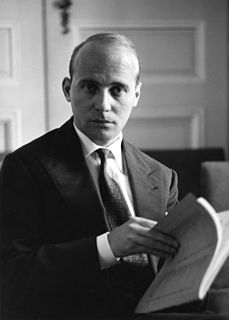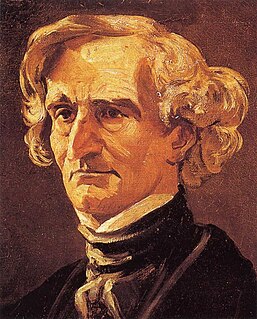Related Research Articles

Hans Werner Henze was a German composer. His large oeuvre of works is extremely varied in style, having been influenced by serialism, atonality, Stravinsky, Italian music, Arabic music and jazz, as well as traditional schools of German composition. In particular, his stage works reflect "his consistent cultivation of music for the theatre throughout his life".

Isang Yun, also spelled Yun I-sang, was a Korean-born composer who made his later career in West Germany.

The Deutsche Oper Berlin is a German opera company located in the Charlottenburg district of Berlin. The resident building is the country's second largest opera house and also home to the Berlin State Ballet.

The Seventh Cross is a novel by Anna Seghers, one of the better-known examples of German literature circa World War II. It was first published in Mexico by El Libro Libre In 1942. The English translation came out in the United States, in an abridged version, in September of the same year. The first full English translation, by Margot Bettauer Dembo, was published in 2018.
Peter Ruzicka is a German composer and conductor of classical music. He was director of the Hamburg State Opera, the Philharmonic Orchestra of Hamburg and the Salzburg Festival. Ruzicka was managing director and Intendant of the Salzburg Easter Festival and is professor at the Hochschule für Musik und Theater Hamburg. The list of his compositions includes numerous orchestral and chamber music works as well as the opera "Celan", about the poet Paul Celan, which was premiered in Dresden in 2001. His opera "Hölderlin" had its premiere at the Berlin State Opera in 2008. Ruzicka's third opera "Benjamin", about the philosopher Walter Benjamin, was written in 2015/16 for the Hamburg State Opera and premiered in 2018.

Das verratene Meer is an opera in two parts and 14 scenes, with music by Hans Werner Henze to a German libretto by Hans-Ulrich Treichel, after Yukio Mishima's novel The Sailor Who Fell from Grace with the Sea. Composed between 1986 and 1989, it was Henze's ninth opera, his third that he wrote for the Deutsche Oper Berlin.

Venus und Adonis is a one-act opera by Hans Werner Henze with a German libretto by Hans-Ulrich Treichel, after the poem by William Shakespeare. The work uses singers and dancers.
Hans Werner Henze's Symphony No. 1 was premiered in Darmstadt in 1947. The premiere was hit by Henze’s accustomed bad luck. The orchestral parts, handwritten by the composer himself, had become illegible during photocopying in Schott’s offices and despite the young composer’s best efforts to ink in the parts throughout the night, only the slow movement was performed. The whole symphony was eventually premiered a year later, although Henze himself conducted the work only after comprehensive revision.
This is the discography of Simon Rattle and other produced works by the English conductor.

Ingo Metzmacher is a German conductor and artistic director of the festival KunstFestSpiele Herrenhausen in Hanover.
Symphony No. 5 by Hans Werner Henze was written in 1962.

A choral symphony is a musical composition for orchestra, choir, and sometimes solo vocalists that, in its internal workings and overall musical architecture, adheres broadly to symphonic musical form. The term "choral symphony" in this context was coined by Hector Berlioz when he described his Roméo et Juliette as such in his five-paragraph introduction to that work. The direct antecedent for the choral symphony is Ludwig van Beethoven's Ninth Symphony. Beethoven's Ninth incorporates part of the Ode an die Freude, a poem by Friedrich Schiller, with text sung by soloists and chorus in the last movement. It is the first example of a major composer's use of the human voice on the same level as instruments in a symphony.
The Seventh Symphony by the German composer Hans Werner Henze was written in 1983-84. It was commissioned by the Berliner Philharmoniker as part of the orchestra's centenary celebrations in 1982.
The Eighth Symphony by the German composer Hans Werner Henze was composed in 1992–93.
Detlev Glanert is a German opera composer, who has also composed numerous works for chamber and full orchestra, including three symphonies.

Hans-Ulrich Treichel is a Germanist, novelist and poet. His earliest published books were collections of poetry, but prose writing has become a larger part of his output since the critical and commercial success of his first novel Der Verlorene. Treichel has also worked as an opera librettist, most prominently in collaboration with the composer Hans Werner Henze.
Fantasia for Strings is a composition by German composer Hans Werner Henze. It was finished in 1966, as part of the soundtrack for Volker Schlöndorff's film adaptation of Robert Musil's novel The Confusions of Young Törless. This composition has been published by Schott Music.
Heliogabalus imperator, allegoria per musica is an orchestral work by the German composer Hans Werner Henze.
Symphony No. 2 by Hans Werner Henze was composed in 1949 and premiered on 1 December that year in Stuttgart by the South German Radio Symphony Orchestra conducted by Hans Müller-Kray. The symphony is dedicated to the conductor Hermann Scherchen.
Hans Werner Henze's Symphony No. 3 was written between 1949 and 1950. It was premiered at the Donaueschingen Festival on 7 October 1951 by the South German Radio Symphony Orchestra conducted by Hans Rosbaud.
References
- Notes to EMI recording of Henze's Ninth Symphony by Christoph Schlüren, Hans Werner Henze and Hans-Ulrich Treichel, 1998
- Walter-Wolfgang Sparrer, "Henzes Neunte--ein Musikdrama ohne Szene," Neue Musikzeitung, October 1997